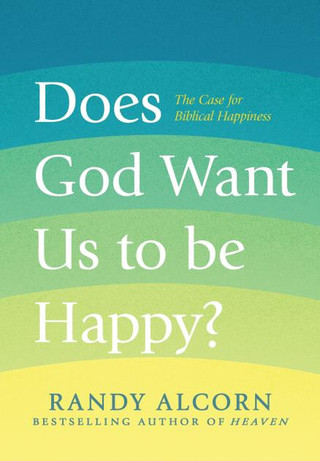When I was writing my book Happiness, I knew that the chapter on “What’s the Difference Between Happiness and Joy?” would likely prove to be one of the most controversial. To verify my assertion that joy and happiness are synonyms, I cited more than one hundred verses in various translations that use joy and happiness together, as well as numerous quotes from trusted Christian pastors, writers, and thinkers who use the two synonymously. (A summarized version of the chapter is available on my blog.)
Still, the idea that the two words are synonyms can be radical to many readers. In response to a post I shared about happiness, a sincerely concerned person wrote me, “Joy, peace, and contentment do not equal happiness.” To some, the difference between the two words is as central as believing in the deity of Christ or the resurrection!
In talking to believers and researching the two words, I think there are at least four reasons why Christians see a need to distinguish between happiness and joy:
1. Many believers have been frequently taught through books and sermons, or have taught others, that happiness and joy are two completely different things.
A pastor friend wrote to tell me why it would be a big mistake to write a book about happiness: “Happiness changes from moment to moment and is reflected by our moods and emotions. Joy is a spiritual peace and contentment that only comes from God and is strong even during times of sadness. God’s desire is not to make us happy in this life but to fill our lives with joy as a result of our relationship with Christ.”
The following is typical of the artificial distinctions made by modern Christians:
Joy is something entirely different from happiness. Joy, in the Biblical context, is not an emotion. . . . Joy brings us peace in the middle of a storm. Joy is something that God deposits into us through the Holy Spirit. . . . There is a big difference between joy and happiness. Happiness is an emotion and temporary; joy is an attitude of the heart.
Judging from such articles (and there are hundreds more out there), you’d think the distinction between joy and happiness is biblical. It’s not. But when something like this is repeated often enough, as it has been from the last half of the 20th century until now, it’s easy to see how it becomes widely accepted truth. Yet there’s a long, rich history of equating joy with happiness in Christ, as shown by writings from the Puritans, Wesley, Spurgeon, and many others. As just one example, consider these words of Charles Spurgeon: “May you so come, and then may your Christian life be fraught with happiness, and overflowing with joy” (“A Happy Christian” Sermon #736).
2. Many Christians believe it’s important to use words to clearly differentiate between the Christian’s experience of godly happiness (specifically called “joy”) and the world’s false happiness.
Oswald Chambers, who I love, was the first I found to speak critically about happiness and make it opposed to joy. Chambers wrote in his book Biblical Ethics, “Happiness is no standard for men and women because happiness depends on my being determinedly ignorant of God and His demands.” Unfortunately, because Bible teachers such as Chambers saw people trying to find happiness in sin, they concluded that pursuing happiness was sinful in and of itself. It’s true that as sinful people, we chronically seek happiness in sin, but the core problem isn’t seeking happiness but choosing sin instead of God.
As Christians, don’t we know that when Scripture speaks of peace, hope, justice, and love, it routinely attaches deeper and more Christ-centered meanings to those words than our culture does? By all means, we should explain that there’s a difference between Christ-centered, God-honoring happiness, and secular, sinful happiness!
Happy isn’t the only word with baggage. Love is commonly used in superficial ways, as popular music has long demonstrated. People say they love hamburgers, hairstyles, and YouTube. They “make love” to someone they barely know. Since the word love has been so trivialized, should we remove it from Bible translations and stop using the word?
Of course not. Instead, we should clarify what Scripture actually means by love, holiness, hope, peace, pleasure, and yes, happiness. We should contrast the meaning in Scripture with our culture’s superficial and sometimes sinful connotations.
So can someone have false, superficial, and ungodly joy? Of course! Just as happiness can be spiritual or unspiritual, so can joy. Isaac Watts (1674–1748), who wrote “Joy to the World,” spoke of “carnal joys.” Charles Spurgeon recognized the difference between false and true joy:
Christ would not have us rejoice with the false joy of presumption, so He bares the sharp knife and cuts that joy away. Joy on a false basis would prevent us from having true joy, and therefore, . . . the joy we may get may be worth having—not the mere surf and foam of a wave that is driven with the wind and tossed, but the solid foundation of the Rock of Ages! (“Christ’s Joy and Ours,” Sermon #2935)
Someone can have Christ-centered happiness or Christ-denying happiness. The former will last forever; the latter has an exceedingly short shelf life.
3. Other Christians don’t want to accept that we should experience happiness that touches our hearts and emotions perhaps because they don’t feel happy, and don’t want to be told it’s what God desires for us.
An e-mail I received from a Christian leader said, “In Scripture we find that God is not about the pursuit of happiness. . . .What, then, of the widespread ambition to be happy? Is it, perhaps, an ultimate idol meant by God’s Enemy to distract us from joy?”
So what’s our problem with happiness? Does it stem from anti-world Christoplatonism? Are we suspicious that someone who’s happy must be sinning? Is it because we think we’re taking the spiritual high ground? Do we feel like “We are above this happiness nonsense,” but since we all want to experience heart-felt happiness and delight, we just call it something else (in this case, “joy”)?
Perhaps we marginalize happiness because something inside us testifies that we—who were snatched from the jaws of Hell to Heaven’s eternal delights, who are indwelt and empowered by a happy God—should be happier than we are. Maybe by defining joy as unemotional, positional, or transcendental, we can justify our unhappiness, in spite of God’s command to rejoice always in Him. Maybe saying that joy isn’t happiness allows us to lower the bar and accept a downtrodden, cheerless Christian life. And if that’s the case, we need to evaluate whether our attitudes are in need of a major paradigm shift.
Of course, no treatment of joy and happiness should deny or minimize the importance of realism and sorrow in the Christian life. The happiness described in Scripture is all the richer because it doesn’t involve denial or pretense and can be experienced amid severe difficulty. Christ-followers don’t preach the flimsy kind of happiness that’s built on wishful thinking. Instead, our rock-solid basis for happiness remains true—and sometimes becomes clearer—in suffering.
4. Satan has vested interests in keeping us from embracing what Scripture teaches about God’s happiness and ours. By convincing us that we can achieve a “joy” that’s stripped of all happy emotion and warmth, he blinds us to the truth about the God-honoring happiness Christ intends for us.
The prophet Isaiah said of a human king who appears to also represent the devil, “How you have fallen from heaven, morning star, son of the dawn! You have been cast down to the earth” (Isaiah 14:12, NIV). Jesus was actually there when this event happened. He told his disciples, “I saw Satan fall like lightning from heaven” (Luke 10:18).The devil has been unhappy ever since he rebelled against the God of happiness and was evicted from Heaven, the home of happiness.
Satan forfeited his own happiness, and he bitterly hates us—the objects of God’s love. His lie from the beginning was that God doesn’t care about our good. The truth is, God wants us to seek real happiness in Him.
The devil tempts us toward what will dishonor God by telling persuasive lies to convince us that the things that make us miserable will actually make us happy. After thousands of years of doing this, he’s remarkably good at it. Jesus said of Satan, “When he lies, he speaks his native language, for he is a liar and the father of lies” (John 8:44, NIV).
Satan hates God, he hates us, and he hates happiness—God’s and ours. He’s not about happiness; he is about sin and misery, which come from seeking happiness where it can’t be found. God is the one who planted our desire for happiness and joy.
So what difference does it make whether we see happiness and joy as synonyms?
To declare joy sacred and happiness secular closes the door to dialogue with unbelievers. If someone is told that joy is the opposite of happiness, any thoughtful person would say, “In that case, I don’t want joy!” If we say the gospel won’t bring happiness, any perceptive listener should respond, “Then how is it good news?”

We need to reverse the trend. My hope is that we can redeem the word happiness in light of both Scripture and church history. Our message shouldn’t be “Don’t seek happiness,” but “You’ll find in Jesus the happiness you’ve always longed for.”
Because this issue is so important, I’ve written a small hard cover book called Does God Want Us to Be Happy? that expands and develops the themes of this article.
Photo by Tim Douglas




